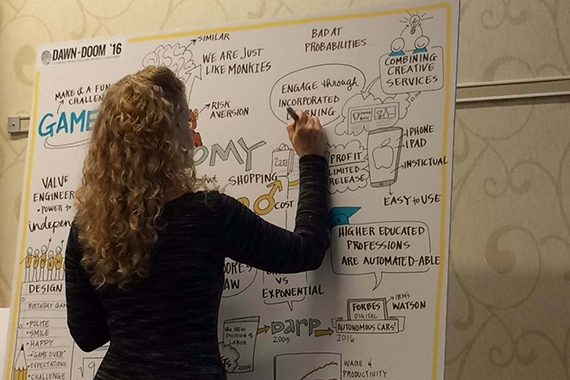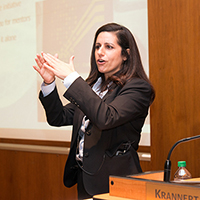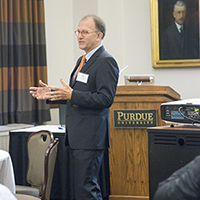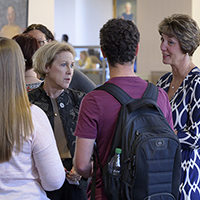 An illustrator from the Ink Factory brings Karthik Kannan's discussion on "Design for Instincts" to life. (Photo provided)
An illustrator from the Ink Factory brings Karthik Kannan's discussion on "Design for Instincts" to life. (Photo provided)
Dawn or Doom '16
Krannert contributes to annual technology conference
A trio of Krannert faculty spoke in October at Dawn or Doom ’16, a free conference on the risks and rewards of new technology on the Purdue West Lafayette campus.
Professor Karthik Kannan, co-director of Krannert’s new Business Information and Analytics Center, spoke about “The Nature of Future Jobs: Innovations Designed for Human Instincts” and its far-reaching effects, from creating products to developing processes for multinational corporations.
As businesses grow in this age of rapid technology changes, they’re having to pivot more quickly as technological innovation happens. Design for Instincts essentially tells businesses they need to stop and consider the consumer — and human nature — to be successful. This seems obvious, but it can get lost on our “next big thing” technology landscape.
“It’s a very simple yet profound concept,” Kannan said. “It’s thinking about what the consumer needs and designing systems with their input. Before, they would do all the deep data dives and then figure out what’s best to do. They’re now saying, ‘Let me go ask the consumer.’ It’s about understanding the end user.”
Professor Mara Faccio, Purdue’s Hanna Chair in Entrepreneurship, discussed “Political Determinants of Competition” and her research showing that consumers are paying too much for their mobile phone bills because of government influence.
“Four percent of high-level employees at mobile phone service companies also have high-level experience in government,” she said. “It begets a quid pro quo environment.”
Government employees are able to affect competition through regulation, price controls, restrictions on entry and more. If they do so in a way that benefits Company A over Company B, they might go on to become Company A’s employees with generous salaries. Faccio’s research reveals specific examples of such cross-pollination at leading providers of mobile services across the United States.
“Competition is more intense in countries where politicians don’t work for the mobile operating companies, and the regulations in place are more likely to protect the interests of consumers,” she said.
David Hummels, dean of Krannert School and professor of economics, spoke on the topic of “International Tech Policies.” Hummels, a research associate for the National Bureau of Economic Research and associate director of the Forum for Research on Empirical International Trade, has worked as a consultant for and visiting scholar at a wide variety of central banks, development banks and policy institutes around the world.
For more information, visit www.purdue.edu/dawnordoom/Press







